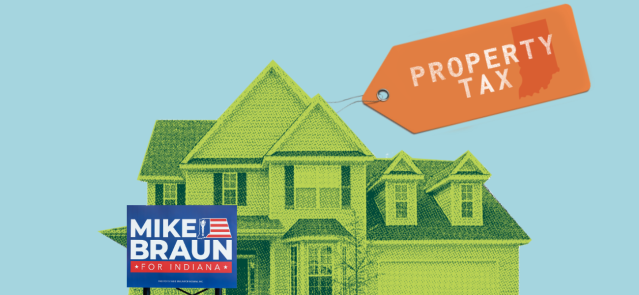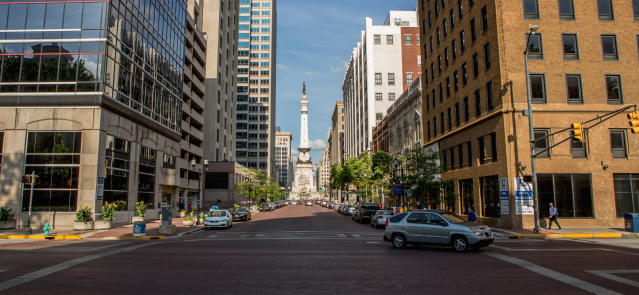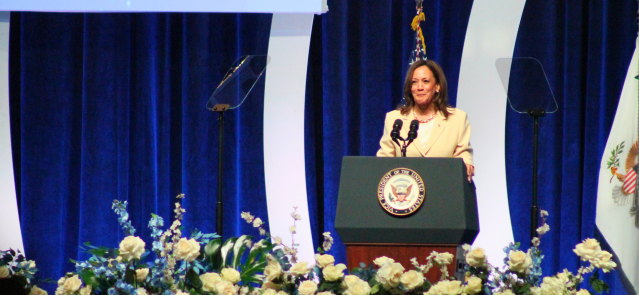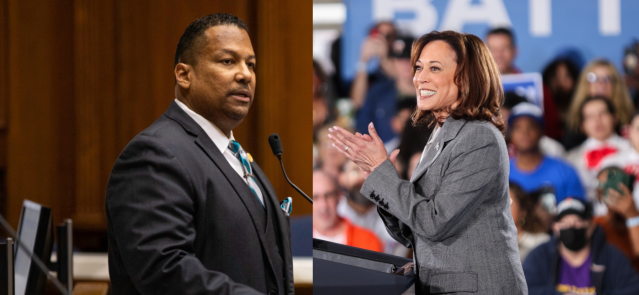Stay ahead of the curve as a political insider with deep policy analysis, daily briefings and policy-shaping tools.
Request a Demo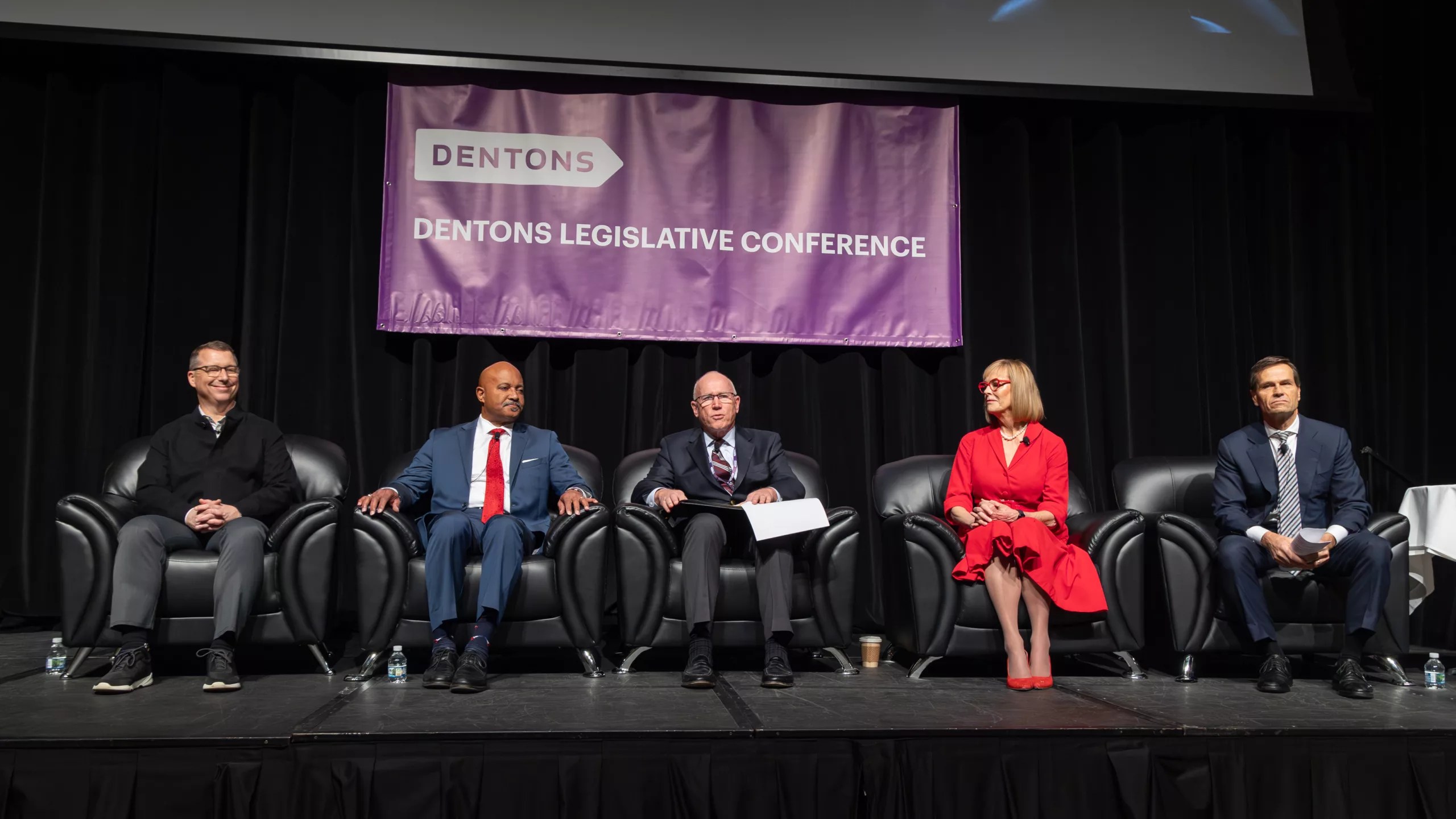
Businessman Eric Doden, former Attorney General Curtis Hill, Lt. Gov. Suzanne Crouch and former Commerce Secretary Brad Chambers participate in a panel on Dec. 13, 2023. (Credit: Mark Curry).
Republican gubernatorial candidates attempted to separate themselves from their opponents during a panel discussion Wednesday, throwing cold water on some of the polices touted by Lt. Gov. Suzanne Crouch and former Commerce Secretary Brad Chambers.
The candidates still haven’t officially debated each other, but Wednesday’s panel at Denton’s Legislative Conference gave each the opportunity to test their messaging ahead of the competitive and pricey May primary.
Whoever wins will face the Democratic candidate in November, but the bigger challenge will likely be in May due to the strong Republican lean of the state.
Crouch, Chambers, former IEDC President Eric Doden and former Indiana Attorney General Curtis Hill all shared the stage at Wednesday’s conference, while Sen. Mike Braun responded via pre-recorded video messages.
It was notably cordial for a rare gubernatorial primary with numerous credible contenders. None of the candidates critiqued each other by name, and even the policy critiques weren’t filled with much bite.
Here are the big takeaways from the panel discussion:
Hill goes far right on social issues
Hill didn’t miss an opportunity to paint himself as the most socially conservative candidate on the stage. In his opening statement, he referenced his opposition to Gov. Eric Holcomb’s mask mandate in 2020 due to concerns about its legality and later said he wanted to make sure critical race theory wasn’t taught in schools.
“We’re witnessing on a day-to-day basis the manipulation of our justice system,” Hill said during his opening comments, “the weaponization of race and the sexualization of our children which is destroying our American way of life.”
The other candidates attempted to create their own lanes, too, using messaging we’ve already seen during the campaign.
For Braun, that meant highlighting his past experience overseeing his business Meyer Distributing. Braun, who is still framing himself as an outsider in campaign ads, emphasized he would approach the government like he would any business.
Crouch, who has also served as a state lawmaker and state auditor, highlighted her decades-worth of experience within state and local government. But, she also attempted to mention her plan to eliminate the income tax, a hallmark of her campaign, as often as possible.
Doden, who has released white papers on a diverse range of topics from zero cost adoption to a plan to “restore” downtown, tried to reference his proposals. He largely focused on the need for economic development across the whole state, including in small communities.
Chambers spent his time emphasizing his success as recent leader of the Indiana Economic Development Corp. During his tenure, he said the semi-quasi government agency attracted $33 billion worth of investment commitments during his tenure. In his opening statement he also emphasized a key difference between him and his opponents: He’s never ran for another office before.
Candidates critique Crouch’s income tax cut plan
Crouch mentioned her plan to eventually phase out the state’s income tax multiple times during the panel, a cost of $8 billion annually to the state (and an additional $4 billion to local communities). But while she’s convinced it’s a great idea, her opponents are skeptical.
“I think it was probably done without maybe thoroughly thinking through that it’s one third of our state revenue,” Braun said in his pre-recorded message. “Obviously, you could not axe the tax.”
Likewise, Chambers said as IEDC’s leader he never once heard a business say the state’s income tax rate was too high.
“I think a $12 billion impact by eliminating income taxes is too severe right now,” Chambers said. “I think we’ll get there over time, but right now today, economically we’re very competitive.”
Crouch shared that if she became governor, she would plan to phase in the tax cut over time, by finding government efficiencies, limiting how much government can grow in the future and implementing triggers in case of economic downturns.
“We can do it, and what does that do for Indiana?” Crouch asked. “It not only puts thousands of dollars back into Hoosier pockets, and it’s their money right, but it also makes Indiana a no-income tax state.”
Chambers defends the LEAP District
Every other candidate also took a shot at Chambers for his role overseeing the LEAP Innovation and Research District, a 9,000-acre tech hub in Boone County. The IEDC has the land readily available for any high-tech industry that wants to move to Indiana.
Braun, for example, said the concept of the LEAP District was good, but the IEDC shouldn’t “get the cart before the horse,” referencing the IEDC’s dilemma of how to get needed water to the district.
Hill criticized the “top-down approach,” Crouch questioned a lack of transparency and Doden argued the state shouldn’t purchase land with taxpayer dollars, like the IEDC did for the LEAP District.
“It’s not that we don’t believe in big projects,” Doden said. “We just don’t believe that should be the primary way that we grow our economy. It has to be a 92-county strategy.”
Chambers listened to the other candidates talk before defending what has quickly become the biggest thorn in his side for the campaign.
“I looked at our position in the global economy and how we compete, and came up with a five-point plan to grow our economy into the future to [bring] high-wage jobs, industries of the future that will power our economy into the future and can keep our kids here by high wage employment,” Chambers said. “I’m very proud of the two-year term as Secretary of Commerce”
No one attacked Sen. Braun
Braun is largely viewed as the frontrunner among Republican circles. Still, his opposing candidates didn’t directly go after any of his policy stances during the panel discussion.
Braun did defend and clarify his stance on qualified immunity, which shields law enforcement officers from liability while performing official duties. But none of the other candidates directly called him out for it on Wednesday.
In a prior campaign ad released by Doden’s campaign, Henry County Sheriff John Spoles said Braun “turned his back on” police when he pushed a bill in the Senate to reform the practice. Braun later walked back the proposal after pushback from police.
On Wednesday, Braun said he proposed the bill as a response to those who wanted to completely eliminate qualified immunity.
“I wanted to codify it, put it in place where it protected law enforcement, got rid of frivolous lawsuits. And when [police] told us they would prefer that you do nothing at the national level … we listened and learned.”
Trump wasn’t a topic of conversation
Former President Donald Trump’s name was only mentioned once during the panel discussion, and that was in passing by Crouch. Even Braun, who has received his endorsement, did not mention Trump.
Contact Kaitlin Lange on X @kaitlin_lange or email her at [email protected].
Facebook @stateaffairsin
Instagram @stateaffairsin
LinkedIn @stateaffairs
4 things to know about Braun’s property tax proposal
Sen. Mike Braun, the Republican candidate for Indiana’s governor, released a plan for overhauling property taxes Friday morning that would impact millions of Hoosiers, Indiana schools and local governments. “Nothing is more important than ensuring Hoosiers can afford to live in their homes without being overburdened by rising property taxes driven by rapid inflation in …
Bureau of Motor Vehicles looks to add new rules to Indiana’s driving test
The Bureau of Motor Vehicles wants to amend Indiana’s driving skills test, putting “existing practice” into administrative rule. Indiana already fails drivers who speed, disobey traffic signals and don’t wear a seatbelt, among other violations. Yet the BMV is looking to make the state’s driving skills test more stringent. A proposed rule amendment looks to …
In Indianapolis, Harris says she’s fighting for America’s future
Vice President Kamala Harris, the presumptive Democratic presidential nominee, told a gathering of women of color in Indianapolis on Wednesday that she is fighting for America’s future. She contrasted her vision with another — one she said is “focused on the past.” “Across our nation, we are witnessing a full-on assault on hard-fought, hard-won freedoms …
Indiana Black Legislative Caucus endorses Harris, pledges future support
The Indiana Black Legislative Caucus unanimously voted Wednesday to endorse Vice President Kamala Harris’ presidential run and will look at ways to assist her candidacy, the caucus chair, state Rep. Earl Harris Jr., D-East Chicago, told State Affairs. The caucus is made up of 14 members of the Indiana General Assembly, all of whom are …

